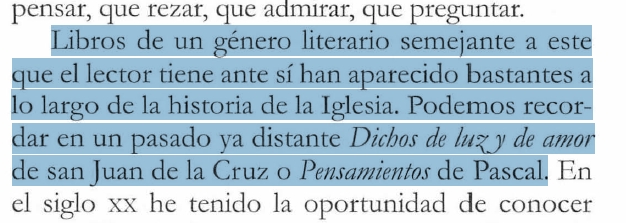I’ve obtained a copy of Kiko Argüello’s new book, published just in time to be scooped up by his followers at their recent “Beginning of the Year” convivences. The book is a diary of sorts and is composed of 504 numbered entries.
Argüello writes:
“For almost thirty years, I have been writing in notebooks, in a sporadic and irregular way, without a specific intention, some thoughts, reflections, maxims, memories, considerations, notes, soliloquies, prayers, etc., aroused in me during the mission of evangelization and catechesis to which the Lord called me in the Church, along with Carmen Hernández and Father Mario Pezzi. Occasionally it crossed my mind the idea of publishing these notes. I rejected it out of modesty and for fear that it was not more than a pretense of my vanity.” [p. xvii]
Argüello declares that he got over his tremendous fear of vanity after he was “strongly requested to make these entries public“. (p. xvii) Argüello repeats the idea that he is afraid of vanity in entry 451, using this quotation as his excuse for writing the book:
“Never stop doing good for fear of vanity; that comes from the devil.”
Is vanity different than any other sin? No, but expect to hear members of the sect use this quotation in the future to justify the extreme cult of personality surrounding their leader.
Not surprisingly, an overwhelming number of the entries, including twelve out of the first thirty, discuss humility…

“10. The Christian is made great by being humble.” p. 4
When he first introduced his book to the Neocatechumenal world during the “Convivenza di Inizio Corso” (Beginning of the Year Convivence) held at the sect’s headquarters in Port San Giorgio, Italy in September, 2016, he told the crowd:
Some people faraway who have read it were speechless. Msgr. Blazquez likens me to Pascal and to St. John of the Cross, just think!
The “humble” Argüello, however, cannot help but twist the meaning of the good Cardinal’s words.

In the book’s “Presentacion”, Cardinal Ricardo Blazquez Perez states that Arguello’s book was in a genre (literary style) similar to books of sayings and spiritual thoughts written by men like St. John of the Cross and Blaise Pascal:
“Books of a similar genre to this that the reader has before him have appeared enough throughout the history of the Church. We can remember in an already distant past “Sayings of Light and Love” of St. John of the Cross or “Pensées” of Pascal.” p. xiii

Obviously, Cardinal Blazquez was comparing literary styles, not men. Moreover, the works by St. John of the Cross and Blaise Pascal mentioned by the Cardinal were published by others after the deaths of those men, not before. Argüello, it seems, couldn’t wait for that…
Humility, indeed.
